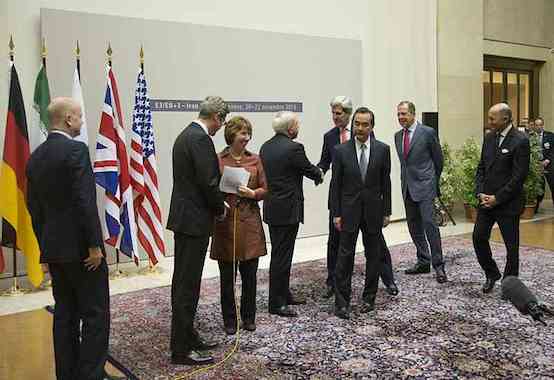Diplomacy with Iran and Hawkish Whataboutism

Like many other Iran hawks, Michael Gerson probably thinks he is making a very clever observation when he says this:
Negotiations on the nuclear issue have taken place in isolation from the ballistic missile issue, the terrorism issue and the regional destabilization issue.
This true as far as it goes, but it’s also not very meaningful. Of course negotiations over the nuclear issue have focused on the nuclear issue to the exclusion of everything else. The Iranians could make a similar complaint that the negotiations are taking place in isolation from U.S. support for the war on Yemen, Israel’s nuclear arsenal, or any one of a number of other objections Iran has to U.S. foreign policy and the policies of U.S. clients in the region. Would we accept an attempt by the Iranians to introduce other complaints about our foreign policy into the talks? Obviously not. We would see it as a deliberate attempt to spoil the talks and to provide their side with a pretext for abandoning the negotiations.
As it is, it has been difficult enough to get to this point in the nuclear negotiations when other issues have been kept separate. If the U.S. or other members of the P5+1 had tried to force other, unrelated items onto the agenda, that would have made it impossible to make any progress at all. One suspects this is what most bothers Iran hawks that make this objection. Their problem with keeping these issues separate is not that it is some “remarkable achievement” by Iran, but that progress in negotiating one issue wasn’t held hostage to other disputes with Iran. Hard-liners that don’t want any deal are always eager to find some unrelated issue that isn’t going to be “fixed” in a given agreement. This is a familiar hawkish complaint about any process of diplomatic engagement. If an arms reduction treaty doesn’t somehow magically lead to political reform or a radical change in the other country’s foreign policy, hawks want to reject the treaty even when it is in our interest to agree to it. If a non-proliferation agreement doesn’t overturn a country’s decades-old support for its regional proxies while nonetheless giving our side most of the concessions, the hawks think it must be a “bad” agreement. This is little more than whataboutism, and it should be taken just as seriously.
Iran hawks set absurdly high expectations for what a given set of negotiations should be able to do and what they should include, and then faults diplomatic progress in the real world for “failing” to live up to impossible standards. Iran hawks want the U.S. to pursue an impossible goal on the nuclear issue by seeking the elimination of Iran’s nuclear program, and they want diplomacy with Iran to address and resolve every other outstanding issue to their satisfaction or else be condemned as worthless. What they’re really saying is that the only kind of diplomacy they are willing to accept is the kind that miraculously forces the other side to concede everything they want at no cost to us.
Considering the conflicts in the region, tensions between Iran and Saudi Arabia, and the generally bad state of U.S.-Iranian relations, getting Iran to agree to significant limitations on its nuclear program is that much more desirable and welcome. Using Iranian behavior elsewhere as an excuse not to make progress on resolving the nuclear issue doesn’t make any of the region’s other problems easier to address. It would deprive the U.S. and the other major powers of an opportunity to secure an agreement that makes one of the region’s potential problems easier to manage. Focusing on the nuclear issue and getting Iran to make important concessions on that issue doesn’t help Iran anywhere else. Furthermore, it is possible that the diplomatic channels that have been created and maintained during the nuclear negotiations could serve as the basis for more routine diplomatic exchanges through which the U.S. and Iran could try manage their disputes on other issues. Making progress on one contentious issue doesn’t guarantee that the U.S. and Iran will be able to do the same on the others, but it proves that it can be done and might be possible to do again.
Comments